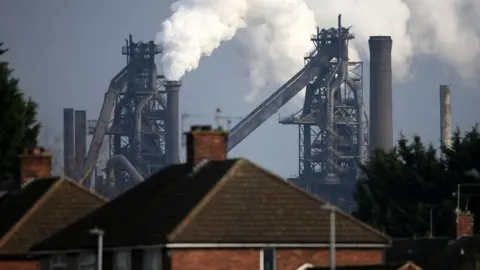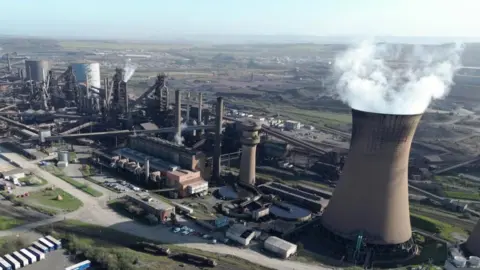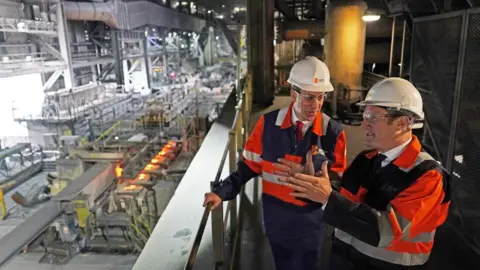Why did the government take control of British Steel?
 Getty Images
Getty ImagesThe UK government has taken control of British Steel's plant in Scunthorpe, Lincolnshire, to prevent it from closing.
A race is now on to try and secure raw materials to stop the plant's blast furnaces from shutting down.
What is British Steel and why is it important?
British Steel's Scunthorpe plant employs 2,700 people, about three-quarters of the company's workforce.
It is the last plant in the UK producing virgin steel, which is used in major construction projects like buildings and railways. It has fewer imperfections than the recycled steel made elsewhere in the country.
Were the plant to stop producing virgin steel, the UK would be the only member of the G7 group of leading economies without the ability to make it. The government views that as a risk to the UK's economic security.
Why is British Steel Chinese-owned?
In 2016, Tata Steel sold the loss-making part of its business that made "long products" like transport rails and steel sections for construction.
Private investment firm Greybull Capital bought it for £1 and renamed the business British Steel.
However, following financial collapse in 2019, British Steel was taken over by the government's insolvency service.
It was sold to Chinese steel-making firm Jingye the following year.
 Reuters
ReutersCan British Steel's blast furnaces keep running?
Scunthorpe's skyline has four blast furnaces, all named after English Queens - Bess, Mary, Anne and Victoria. Bess and Anne are the only two still working.
The supplies needed to keep them running - coking coal and iron pellets - are running low.
However, the government says the materials are "in the country". Officials are "working as fast as they possibly can" to get them to the plant.
On Saturday, Business Secretary Jonathan Reynolds said it had become clear that Jingye intended to "refuse" to buy enough material to keep the furnaces running, and "to cancel and refuse to pay for existing orders".
"The company would therefore have irrevocably and unilaterally closed down primary steel making at British Steel," he added.
Why can't a blast furnace easily be restarted?
Turning off a blast furnace without making it permanently unusable is notoriously difficult.
The furnaces operate at extreme temperatures, with iron ore and coking coal poured in at the top and liquid iron extracted at the bottom. This iron goes to the steel plant to make steel.
If a furnace stops working, the molten metal will cool and solidify. This is called a "salamander".
When the furnace is turned back on this metal heats up again and expands which can crack the furnace.
A so-called "Salamander Tap" process can be used to temporarily shut down a blast furnace by drilling a hole to remove any remaining hot metal. However, this can be a dangerous process.
Has British Steel been nationalised?
The emergency legislation fast-tracked through Parliament on Saturday gives the government the ability to order raw materials for the furnaces and to direct the company's workforce and managers.
Any employees sacked by the Chinese owners can be reinstated and the plant can be entered by force, if necessary, to secure assets.
But Jingye will retain ownership of it for now.
This means British Steel has not been nationalised - which is when a government takes ownership and control of a company.
However, the business secretary acknowledged that public ownership was "the likely option" as there are currently no companies willing to buy the plant.
If British Steel is nationalised, taxpayers' money will be used to run it. Reynolds says it is currently making an annual net loss of £233m, but had the furnaces been allowed to shut the cost to the taxpayer would be higher.
 Getty Images
Getty ImagesWhy is the Scunthorpe plant losing money?
In late March 2025, Jingye said the plant was losing around £700,000 a day and launched a consultation on its closure.
It said the blast furnaces were "no longer financially sustainable," blaming "highly challenging" market conditions, tariffs and costs associated with moving to lower-carbon production techniques.
UK steel production has been falling for several decades and the financial pressures facing the industry were heightened in March when the US imposed a 25% tariff on any steel it imports.
Global over-production has created "a glut of steel on the international market", according to a UK government UK government briefing, which has pushed prices down. British manufacturers also face higher costs, particularly on electricity, than elsewhere.
After the government took control of the plant, China's embassy in the UK said it was "closely following" developments.
It said: "It is an objective fact that British steel companies have generally encountered difficulties in recent years."
Who else produces steel in the UK?
There are 1,160 businesses in the UK steel industry, directly supporting 40,000 other firms, according to government figures.
Tata Steel at Port Talbot in Wales was once the UK's largest virgin steel producer but it turned off its blast furnace in September 2024, saying it was losing £1.7m a day.
An agreement with the UK government was reached which saw it commit £500m to help the company move to greener forms of steelmaking.
Other steelmakers in the UK include Liberty Steel, Celsa, Marcegaglia and Outokumpu.
Liberty Steel also has a plant in Scunthorpe which is facing closure. More than 120 jobs are at risk, with bosses blaming high energy costs.
In 2023 the UK steel industry contributed £2.3 billion to the UK economy - equivalent to 0.1% of total UK economic output and 1.0% of manufacturing output.
In the same year, the UK produced 5.6 million tonnes of crude steel, or 0.3% of the world's total. In comparison, China produced more than 1,000 million tonnes, 54% of global production.
The EU produced 126 million tonnes of steel in 2023, 7% of the world's total. Compared with EU countries, the UK ranked as the eighth largest steel producer, after Germany, Italy, Spain, France, Austria, Poland and Belgium.
